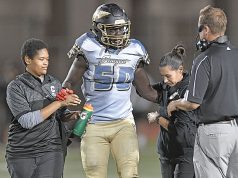Officiating is all about making decisions. That’s arguably the one and only reason they give us a paycheck. Sometimes, in the process of decision-making, we eliminate alternatives that may actually be better than the one we ultimately choose.
That is one reason why officiating is so difficult — truly effective decision-making requires a considerable amount of data analysis, listening and reflection. We’re expected to decide sometimes hundreds of times during the course of a game, and we have to do it now.
Effective decision-making is the process of identifying potential infractions, then taking action. The three main stages of the decision-making process are: clarifying what the decision is; assessing exactly what is involved; and utilizing all the necessary resources including rules knowledge, mechanics and experience.
Another hindrance to decisiveness is that many people see conflicts as “bad,” and have trouble being decisive because they fear their decision will lead to confrontations. They refuse to take risks.
Without question, the best officials at every level are decisive. The tough calls come their way, and they make them accurately without flinching. But how do the rest of us get to that place? There are several parts of your game you can work on that will improve your decisiveness.
Rules knowledge
The first element to developing the confidence necessary to becoming a decisive official is rules knowledge. Yet often it is dismissed as a given, something too rudimentary to give much more than a passing thought.
There’s just no excuse for not knowing the rulebook. And there’s nothing worse than going in and thinking you know what the rule is and being wrong. Essentially, that is false confidence, flying in the face of the notion that “rightness” is one of the four key components of decisiveness.
Mechanics and positioning
An official could be a walking encyclopedia when it comes to the rulebook, but that isn’t a guarantee he or she will know what to do once the game starts. Good mechanics go hand-in-hand with rules knowledge.
Being in the right place at the right time is paramount. If you are there, coaches will accept almost any call. The mechanics of selling the call is important for appearing decisive. Being where you are supposed to be and watching what you’re supposed to watch go a long way toward demonstrating that.
Continued learning
Most of us know officials who think they’re at the top of their game, but are, in fact, lacking in one or more areas. Any suggestion those officials may want to join you at a clinic is rebuffed.
Chances are, when the game is on the line, that official will have problems. Do you ever get “good enough” to stop learning? Relying on assumptions and guesswork instead of facts and knowledge — a trap easily fallen into if you don’t keep up with new training every season — will lead to faulty decisions.
An erroneous perception of the factors involved in a call can predispose a decision to failure. Limit your reliance on intuitive, impulsive or emotional responses, and base your decisions on high-quality data whenever possible.
Talking game situations over with new officials who have questions often helps veteran officials at least as much as the newer official.
“Do it right the first time,” is a good guideline when decisions involve a repeated process, such as making quality calls game in and game out.
But don’t let the fear of failure keep you from taking decision-making risks. Success often comes through what could be considered failures or mistakes. Every successful official has made bad calls and poor decisions at one time or another. Mistakes and failures are some of the hardest lessons in life, but they create opportunities for personal and professional growth.
Strive to make the right calls at the right time with confidence and integrity, and make decisions you take responsibility for and can support publicly. Above all, learn from mistakes. Discuss what worked and what didn’t with your mentor, supervisor and trusted peers. Avoid blaming others. Relive the process and reassess what you would do differently, then move on.
Certainly your games will go better: Coaches and players will accept your calls most of the time, you’ll suddenly start to have an “easier time” of things out there, but you’ll also quietly be developing something much more important to any official — a good reputation.
Coaches need officials to be decisive, and when they see an official who shows confidence without arrogance they feel more comfortable with that official.
Leadership potential
Another benefit to increasing your decisiveness is you will likely be perceived as a leader. Decisive officials are those officials who are truly ready for the biggest calls in the biggest games. Like all-star players, they want the critical plays to come their way.
Decisiveness is one of those intangibles in officiating that can make or break you in so many ways: having your calls accepted, getting the big games, moving up, earning you a good reputation and identifying you as a leader. The good news is: You can work on it. As you do, you’ll notice things changing for the better.
To be decisive, you have to be a decision maker, a risk taker and a long-term student of the game. Then you’ll be super efficient and successful in officiating
What's Your Call? Leave a Comment:
Note: This article is archival in nature. Rules, interpretations, mechanics, philosophies and other information may or may not be correct for the current year.
This article is the copyright of ©Referee Enterprises, Inc., and may not be republished in whole or in part online, in print or in any capacity without expressed written permission from Referee. The article is made available for educational use by individuals.

















